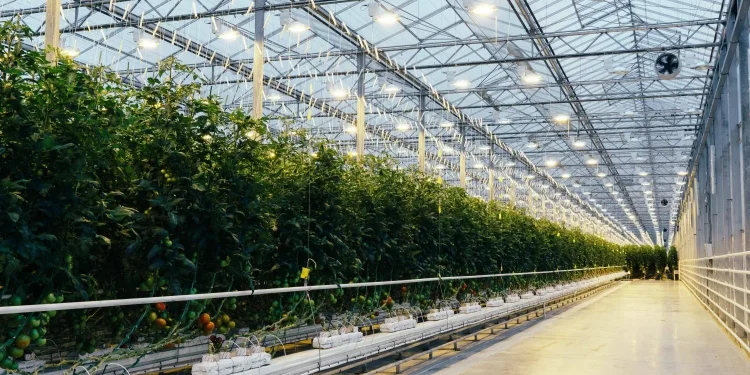In the heart of Baidoa, southern Somalia, a greenhouse farming initiative is providing displaced families with not only a source of income but also hope for a better future. This project has emerged as a beacon of sustainable agricultural practices and offers valuable insights for investors and entrepreneurs looking for innovative opportunities in the agricultural sector.
Greenhouse Farming: A Sustainable Solution for Displaced Families
In response to the dire circumstances faced by displaced families in Garasweyne IDP camp, a greenhouse farming project was launched to offer a secure and sustainable livelihood. The project aims to address both food security and economic stability through the cultivation of fresh produce. By focusing on greenhouse farming, the initiative has created a model that can be replicated in similar contexts worldwide.
Fiiday Ali Ibrahim, a resident of the Garasweyne camp, exemplifies the success of this project. As part of a team managing a greenhouse farm, Fiiday grows tomatoes and lettuce, which are sold to local suppliers, restaurants, and grocery stalls in Baidoa. Her daily earnings of $5-6 have significantly improved her family’s quality of life, allowing them to enjoy three meals a day and manage unforeseen expenses, such as medical needs.
Fiiday’s story highlights the transformative impact of greenhouse farming on displaced communities. “This work means happiness for me and my family,” she explains. “It has facilitated a lot for us. If one of my children gets sick today, it’s easier for us to manage.”
How the Greenhouse Farming Project Operates
The greenhouse project in Baidoa represents a strategic approach to sustainable agriculture. The greenhouses provide a controlled environment for growing crops, which is particularly beneficial in regions with challenging climates. This method allows for the efficient use of water and resources, which is essential in arid environments like those found in southern Somalia.
The project has set up greenhouses on the outskirts of Baidoa, where displaced families are employed to manage the farms. The initiative focuses on high-value crops such as tomatoes and lettuce, which have a high market demand and can be cultivated effectively in greenhouse conditions.
Economic and Social Benefits
The greenhouse farming initiative delivers substantial economic benefits. It creates employment opportunities for displaced individuals, providing a steady source of income and fostering economic independence. For many, like Fiiday, the project is more than just a job; it represents a lifeline to a more stable and prosperous life.
The project also contributes to the local economy of Baidoa. By selling produce to local suppliers, restaurants, and grocery stores, the greenhouses support the local agricultural supply chain and stimulate economic activity in the region.
Additionally, the project serves as a model for social integration and community building. It brings together displaced families in a collaborative environment where they can work towards common goals. The skills and knowledge gained through the project empower individuals and foster a sense of hope and resilience.
Environmental and Sustainability Aspects
From an environmental perspective, the greenhouse farming project embodies principles of sustainability. The use of greenhouses minimizes water wastage and reduces the environmental impact of traditional farming methods. This method allows for year-round production of fresh produce, which is crucial for food security in regions where agricultural conditions are less than ideal.
The project also emphasizes the importance of efficient resource management and environmental stewardship. By adopting modern agricultural technologies and practices, the initiative demonstrates how greenhouse farming can be a viable solution for addressing food shortages and supporting displaced communities in a sustainable manner.
Opportunities for Investors and Entrepreneurs
For investors and entrepreneurs seeking opportunities in the agricultural sector, the Baidoa greenhouse farming project offers several valuable lessons and opportunities:
- Sustainable Agriculture: The success of greenhouse farming in Baidoa highlights the potential for sustainable agricultural practices to address food security and economic challenges in similar contexts. Investing in greenhouse technologies and systems can provide a scalable solution for regions facing climatic and resource constraints.
- Social Impact: Projects like the one in Baidoa offer significant social impact by creating jobs, supporting displaced families, and fostering community development. Investors interested in projects with both financial returns and social benefits may find greenhouse farming initiatives particularly appealing.
- Innovation in Arid Environments: The success of greenhouse farming in an arid region demonstrates the viability of innovative agricultural solutions in challenging environments. This opens up opportunities for developing and expanding greenhouse farming technologies and methods in other regions with similar conditions.
Looking Forward: The Future of Greenhouse Farming in Baidoa and Beyond
As the greenhouse farming project in Baidoa continues to grow, there are plans to expand and replicate the model in other areas facing similar challenges. Future developments may include increasing the scale of greenhouse operations, diversifying the range of crops, and enhancing the training and support provided to displaced families.
The project also serves as a pilot for potential future investments in greenhouse agriculture, with opportunities for scaling up and exploring new markets. By building on the success of the Baidoa initiative, there is potential for greenhouse farming to become a widespread and effective solution for sustainable agriculture in other regions.










